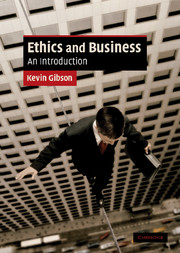Book contents
3 - The capitalist system and its ethical implications
Published online by Cambridge University Press: 05 June 2012
Summary
The Body Shop
Anita Roddick was struggling to support herself and her two young children when she opened a shop to sell homemade cosmetics in 1976. The ingredients were natural and exotic, and customers were invited to refill their bottles. Soon the business had become popular, and she wanted to open a second store. Her local bank manager told her to wait a year, but instead she made a deal with a local used car salesman, Ian McGlinn, who bought a half share in the company for £4,000 (approximately $7,000), and he has not taken an active role in the business since.
The products attracted customers through promotions that touted ecologically friendly practices, natural ingredients, animal welfare, and fair trade with indigenous peoples. Roddick teamed with the organization Greenpeace in a “save the whales” campaign to substitute jojoba oil for whale spermaceti in cosmetics. She has promoted causes ranging from banning animal testing to fostering the use of ingredients grown by small farms in the third world. She has supported a wide range of social causes and has allowed her workers to dedicate one day a month to outside activism.
The business grew rapidly, and franchises opened around the world. At its height, there were some 2,000 stores in 48 countries. Roddick publicly floated the company in 1985, and by 1992 shares were trading at 360 pence, more than triple their initial price. Roddick and her husband ranked among the richest people in Britain.
- Type
- Chapter
- Information
- Ethics and BusinessAn Introduction, pp. 53 - 77Publisher: Cambridge University PressPrint publication year: 2007



